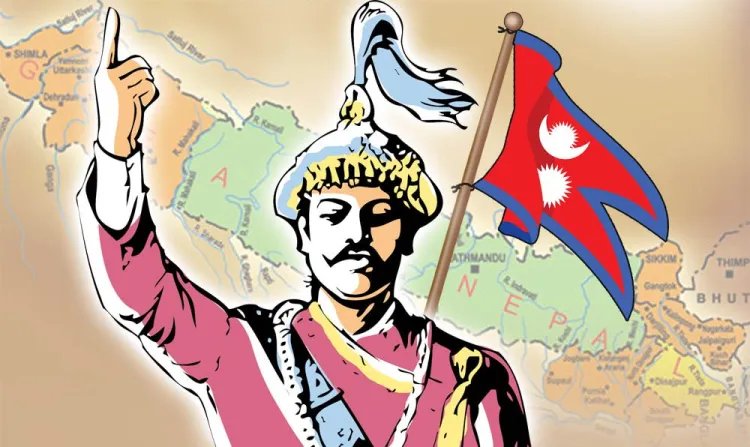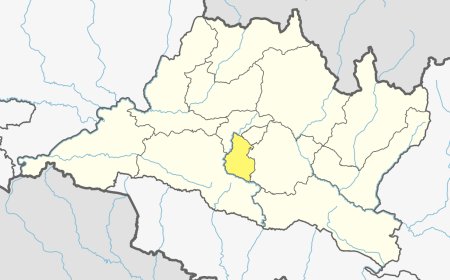Prithvi Narayan Shah: Founder of Modern Nepal
Discover Prithvi Narayan Shah, the visionary leader who united Nepal, shaped its history, and fostered national unity. Uncover his strategies, challenges, and enduring legacy as the "father of the nation".

Prithvi Narayan Shah, widely regarded as the founding father of modern Nepal, was a visionary leader who played a pivotal role in uniting various small kingdoms into one cohesive nation. This article delves deep into the life, accomplishments, and historical significance of Prithvi Narayan Shah, shedding light on his early years, his rise to power, and the enduring legacy he left behind.
Early Life and Background
Prithvi Narayan Shah, the visionary architect of Nepal's unification, was born in 1723 in the Gorkha Kingdom, which is now part of modern-day Nepal. He hailed from the Shah dynasty, a lineage tracing back to the ancient Malla dynasty of Kathmandu. From a young age, Prithvi Narayan Shah exhibited exceptional qualities of leadership, displaying a profound interest in politics and military affairs.
Growing up in the turbulent political landscape of 18th-century Nepal, Prithvi Narayan Shah witnessed the fragmentation of the country into numerous small kingdoms, each with its own rulers and interests. The constant conflicts and lack of unity among these kingdoms deeply impacted Prithvi Narayan Shah and instilled in him a resolute determination to bring about a change.
As a young prince, Shah received a comprehensive education that included military training, political philosophy, and diplomacy. His exposure to these various disciplines equipped him with the knowledge and skills necessary to navigate the complex political terrain of the time.
Furthermore, Prithvi Narayan Shah was influenced by his family's rich cultural heritage and the history of his ancestors. The Shah dynasty's connection to the Malla dynasty, renowned for its patronage of arts and culture, inspired Prithvi Narayan Shah's deep appreciation for Nepal's traditions, language, and diverse ethnic groups.
In addition to his intellectual and cultural upbringing, Prithvi Narayan Shah inherited a kingdom characterized by strategic advantages. Gorkha, his birthplace, was geographically situated in a central location, providing him with a vantage point from which to launch his unification campaign. The region's hilly terrain also played a crucial role in developing the martial skills of the Gorkhali people, who would later become the backbone of his army.
Prithvi Narayan Shah's formative years were marked by a profound understanding of the political, cultural, and geographical aspects of Nepal. This foundation would shape his vision for a unified Nepal and lay the groundwork for his remarkable achievements in the years to come.
By expanding on Prithvi Narayan Shah's early life and background, we can better comprehend the factors that shaped his character, fueled his ambition for unification, and set the stage for his subsequent rise to power.
The Fragmented Kingdoms of Nepal
During Prithvi Narayan Shah's time, Nepal was a land characterized by a fragmented political landscape, with numerous small kingdoms ruling over distinct territories. These kingdoms, including Kathmandu, Bhaktapur, Patan, and others, operated as separate entities with their own rulers, armies, and interests.
The fragmentation of Nepal posed several challenges to the overall stability and development of the region. The individual kingdoms often engaged in conflicts and power struggles, leading to a lack of unity and coordination in addressing common issues. This internal disunity made it easier for external forces, such as the British East India Company, to exploit the divisions and exert influence over the region.
Moreover, the fragmented nature of the kingdoms hindered economic growth and hindered inter-regional trade. Each kingdom maintained its own trade policies, creating barriers to commerce and limiting opportunities for economic prosperity.
Prithvi Narayan Shah recognized the detrimental effects of this fragmented state and understood that the only way to safeguard Nepal's sovereignty and ensure its progress was through unification. His vision extended beyond the narrow interests of individual kingdoms and embraced a broader concept of a unified Nepal that would be strong, self-reliant, and capable of resisting external threats.
By focusing on the unification of Nepal, Prithvi Narayan Shah sought to consolidate the strength of the smaller kingdoms into a single unified nation. He understood that a united Nepal would be better equipped to defend its borders, assert its sovereignty, and promote the welfare of its people.
Through strategic alliances, military campaigns, and diplomatic negotiations, Prithvi Narayan Shah gradually brought together the smaller kingdoms under his leadership. He navigated the complexities of regional politics, leveraging alliances and exploiting divisions among the rival kingdoms to further his unification efforts.
Prithvi Narayan Shah's unification campaign was not just a military conquest but also a process of fostering a sense of shared identity and purpose among the diverse communities residing within the territories. He recognized the importance of incorporating the cultural, linguistic, and ethnic diversity of Nepal into a cohesive national identity, thereby creating a sense of unity among the people.
Rise to Power
Prithvi Narayan Shah's ascent to power marked the beginning of a new era for Nepal. His journey to becoming the unifying force behind the nation was fraught with challenges and required astute political maneuvering, strategic alliances, and military prowess.
-
Inheriting the Gorkha Kingdom:
Prithvi Narayan Shah inherited the Gorkha Kingdom from his father, King Nara Bhupal Shah. However, the kingdom itself was relatively small and not a dominant power in the region. Prithvi Narayan Shah recognized the limitations of his kingdom and set his sights on expanding its influence.
-
Strategic Vision:
Prithvi Narayan Shah possessed a visionary outlook and realized the need for Nepal to emerge as a unified nation to counter external threats and ensure stability. He understood the fragmented nature of the region, with numerous smaller kingdoms vying for power, and recognized the inherent weaknesses in Nepal's divided state.
-
Military Reforms:
To fulfill his vision of a unified Nepal, Prithvi Narayan Shah implemented significant military reforms. He modernized the Gorkha army by introducing new weapons, training methods, and military strategies. These reforms bolstered the strength and efficiency of his forces, enabling them to engage in successful campaigns.
-
Diplomatic Alliances:
Prithvi Narayan Shah recognized the importance of strategic alliances with neighboring powers to achieve his goals. He skillfully forged alliances with influential regional entities, such as the Kingdom of Palpa and the King of Nuwakot, to consolidate his power base and gain support for his unification campaign.
-
Expansionist Policies:
Prithvi Narayan Shah adopted an expansionist approach, systematically annexing smaller kingdoms and bringing them under his rule. His military campaigns extended beyond Gorkha, gradually subjugating territories such as Lamjung, Tanahun, and Kaski. This strategic expansion allowed him to build a strong foundation for a unified Nepal.
-
Diplomacy and Negotiations:
While military conquest played a significant role, Prithvi Narayan Shah also employed diplomacy and negotiation to further his objectives. He engaged in diplomatic negotiations with regional powers, presenting compelling arguments for a unified Nepal that would benefit all parties involved. His diplomatic skills were instrumental in securing alliances and ensuring the success of his unification campaign.
-
Enduring Resistance:
Prithvi Narayan Shah faced formidable resistance from various quarters, including rival kingdoms and external forces. However, his strategic acumen, determination, and military strength allowed him to overcome these obstacles. His perseverance in the face of adversity demonstrated his unwavering commitment to his mission of unifying Nepal.
By strategically utilizing military might, diplomatic alliances, and skillful negotiations, Prithvi Narayan Shah successfully rose to power and established himself as the driving force behind Nepal's unification. His rise to power showcased his visionary leadership and set the stage for the transformative changes that would shape Nepal's future as a united nation.
The Unification Campaign
Prithvi Narayan Shah's unification campaign stands as a testament to his unwavering determination and strategic brilliance. This section delves deeper into the major battles, conquests, and diplomatic triumphs that characterized his quest to forge a unified Nepal.
-
Military Campaigns:
Prithvi Narayan Shah recognized that military conquest was essential to achieving his goal of unifying Nepal. He strategically planned and executed a series of military campaigns to expand his influence and bring smaller kingdoms under his control. Notable military campaigns include:
-
Conquest of Nuwakot:
Nuwakot, strategically located in the western part of Nepal, was a vital stepping stone for Prithvi Narayan Shah's ambitions. After a prolonged siege, he successfully captured Nuwakot in 1744, establishing it as his first capital and a base for future expeditions. -
Annexation of Kathmandu Valley:
Prithvi Narayan Shah recognized the significance of the Kathmandu Valley, which housed the core of Nepal's cultural and political power. In 1768, his forces triumphantly entered the valley, culminating in the unification of the major city-states, including Kathmandu, Patan, and Bhaktapur. -
Eastern Conquests:
Prithvi Narayan Shah's unification efforts extended to the eastern regions of Nepal. He strategically employed diplomacy and military tactics to secure alliances with influential chiefs and kingdoms, gradually expanding his authority to areas such as Morang, Jhapa, and Sikkim.
-
-
Diplomatic Maneuvers:
Prithvi Narayan Shah's success in the unification campaign was not solely reliant on military conquests. He skillfully employed diplomatic maneuvers to gain strategic advantages and neutralize potential threats. Key diplomatic strategies include:
-
Treaty with Tibet:
Prithvi Narayan Shah recognized the importance of maintaining a favorable relationship with neighboring Tibet. In 1792, he signed the Treaty of Betrawati with Tibet, ensuring a peaceful border and access to trade routes, thereby bolstering Nepal's economic and strategic position. -
Diplomatic Alliances:
Prithvi Narayan Shah forged alliances with influential regional powers, such as Gorkha's alliance with the Baise and Chaubise principalities. These alliances not only provided military support but also helped consolidate his authority and counterbalance potential opposition.
-
-
Innovative Tactics:
Prithvi Narayan Shah's military campaigns were not solely dependent on sheer force. He implemented innovative tactics to outmaneuver and defeat his opponents, including:
-
Psychological Warfare:
Prithvi Narayan Shah recognized the importance of psychological warfare. His forces employed tactics such as spreading rumors, creating divisions among rival factions, and undermining the morale of enemy troops, which proved crucial in achieving victory. -
Guerrilla Warfare:
Prithvi Narayan Shah's army utilized guerrilla warfare tactics, taking advantage of the rugged terrain and the element of surprise. This unconventional approach allowed his forces to launch swift and effective attacks, often catching his enemies off guard.
-
-
Consolidation of Power:
As Prithvi Narayan Shah expanded his influence, he faced the challenge of consolidating power and integrating diverse regions and ethnicities into a cohesive nation. He implemented several measures to ensure stability and unity, including:
-
Administrative Reforms:
Prithvi Narayan Shah established a centralized administrative system, with appointed governors overseeing different regions. This helped streamline governance and maintain law and order throughout the newly unified Nepal. -
Cultural Integration:
Prithvi Narayan Shah recognized the importance of fostering a sense of national identity. He encouraged cultural exchange and integration among the diverse ethnic groups of Nepal, emphasizing the commonalities and shared heritage that bound them together.
-
So, Prithvi Narayan Shah's unification campaign was characterized by strategic military conquests, diplomatic negotiations, and innovative tactics. Through his visionary leadership, he transformed a fragmented Nepal into a unified nation, laying the foundation for the political, social, and cultural development that shaped the country's history. His campaigns and consolidation efforts continue to be revered as a testament to his strategic brilliance and enduring legacy.
Contributions and Reforms
Prithvi Narayan Shah's unification of Nepal was not limited to military conquests. He recognized the need to strengthen the newly unified nation through various reforms and initiatives. This section explores the significant contributions made by Prithvi Narayan Shah to promote stability, development, and cultural preservation in Nepal.
-
Administrative Reforms:
Prithvi Narayan Shah introduced administrative reforms to establish a robust governance system. He centralized power and created a unified administration, bringing together the diverse regions under a single authority. This allowed for better coordination and efficient decision-making, laying the foundation for a more cohesive and organized nation.
-
Economic Reforms:
Realizing the importance of economic prosperity, Prithvi Narayan Shah implemented measures to boost trade and commerce. He promoted domestic industries and encouraged self-sufficiency, reducing Nepal's reliance on external sources. He established trade routes and improved transportation infrastructure, facilitating the movement of goods and stimulating economic growth.
-
Social Reforms:
Prithvi Narayan Shah aimed to foster social harmony and unity among the diverse ethnic and religious communities of Nepal. He encouraged cultural exchange and mutual respect, emphasizing the shared heritage of the Nepali people. His policies promoted inclusivity, ensuring the representation and participation of various groups in the nation-building process.
-
Preservation of Cultural Heritage:
Prithvi Narayan Shah recognized the importance of preserving Nepal's rich cultural heritage. He took measures to protect religious and cultural sites, ensuring their preservation for future generations. Additionally, he promoted the Nepali language, literature, and arts, encouraging the development and promotion of indigenous cultural expressions.
-
Infrastructure Development:
To facilitate trade, communication, and governance, Prithvi Narayan Shah prioritized infrastructure development. He constructed roads, bridges, and irrigation systems, improving connectivity and enabling economic activities to flourish. These infrastructure projects not only enhanced the living standards of the people but also promoted unity and integration across the newly unified nation.
-
Patronage of Education and Religion:
Prithvi Narayan Shah understood the significance of education and religious institutions in the development of a nation. He patronized the establishment of schools, monasteries, and temples, providing access to education and fostering spiritual growth. This support for education and religion not only contributed to the intellectual and moral development of the people but also reinforced the cultural fabric of Nepal.
-
Encouragement of Local Governance:
Prithvi Narayan Shah valued local governance and encouraged the participation of local communities in decision-making processes. He respected the autonomy of smaller regions and appointed trusted representatives to govern them. This approach helped maintain a balance between centralized authority and local autonomy, ensuring a sense of ownership and participation among the people.
By implementing these contributions and reforms, Prithvi Narayan Shah laid the foundation for a stronger and more cohesive Nepal. His vision extended beyond military conquests, focusing on the holistic development of the nation. These initiatives played a crucial role in shaping Nepal's identity, fostering unity among diverse communities, and promoting sustainable progress in various spheres of society. Prithvi Narayan Shah's contributions continue to inspire and guide the nation to this day.
Cultural Preservation and Promotion
Prithvi Narayan Shah's reign was characterized by a deep appreciation for Nepal's diverse cultural heritage. He recognized the importance of preserving and promoting the country's unique traditions, languages, and arts. This section will delve further into Prithvi Narayan Shah's efforts to safeguard and nurture Nepal's rich cultural identity.
-
Protection of Religious and Cultural Sites:
Prithvi Narayan Shah understood the significance of Nepal's religious and cultural sites as repositories of the nation's history and spirituality. He took proactive measures to protect and maintain these sites, ensuring that they remained accessible to the people of Nepal. Through his patronage, he supported the renovation and restoration of temples, palaces, and monasteries that hold immense cultural and religious significance.
-
Promotion of the Nepali Language and Literature:
Prithvi Narayan Shah recognized the importance of a unified language in fostering a sense of national identity. He played a crucial role in promoting the Nepali language as a unifying force among the diverse ethnic groups within Nepal. Under his patronage, Nepali literature flourished, with the encouragement of poets, scholars, and writers who composed literary works in Nepali. This support helped in the standardization and popularization of the Nepali language, contributing to the development of a shared cultural heritage.
-
Patronage of Arts and Architecture:
Prithvi Narayan Shah's reign witnessed a remarkable flourishing of artistic expression and architectural grandeur. He encouraged the creation of sculptures, paintings, and other art forms that celebrated Nepal's cultural traditions. Prithvi Narayan Shah himself was an avid patron of the arts, supporting artists and craftsmen in their endeavors. His patronage also extended to the field of architecture, with the construction and renovation of palaces, forts, and other structures that showcased Nepal's distinct architectural styles.
-
Preservation of Festivals and Rituals:
Nepal's festivals and rituals hold immense cultural and religious significance, serving as important occasions for communities to come together and celebrate. Prithvi Narayan Shah actively worked towards the preservation and promotion of these festivals, ensuring that they continued to be observed throughout the kingdom. By safeguarding and supporting these traditions, he reinforced the cultural bonds that united the people of Nepal.
-
Encouragement of Cultural Exchange:
Prithvi Narayan Shah recognized the value of cultural exchange in fostering understanding and unity among different ethnic communities. He encouraged interactions between diverse groups and facilitated the exchange of ideas, traditions, and artistic practices. This inclusive approach promoted a sense of belonging and shared cultural heritage among the people of Nepal, fostering a strong national identity.
Prithvi Narayan Shah's commitment to cultural preservation and promotion played a vital role in shaping Nepal's identity. His efforts to protect religious and cultural sites, promote the Nepali language and literature, support arts and architecture, preserve festivals and rituals, and encourage cultural exchange laid the foundation for Nepal's diverse cultural heritage. Today, his legacy continues to inspire the Nepali people to cherish and celebrate their cultural roots while embracing the spirit of unity that he fostered.
Legacy and Impact
Prithvi Narayan Shah's legacy reverberates throughout Nepal's history, society, and culture, leaving an indelible mark on the nation. His unification of Nepal and the policies he implemented during his reign continue to shape the country's trajectory. Here are some key points that highlight the lasting legacy and impact of Prithvi Narayan Shah:
-
National Unity and Identity:
Prithvi Narayan Shah's unification campaign brought together diverse ethnic groups, languages, and cultures under one national identity. By establishing a unified Nepal, he fostered a sense of pride and shared heritage among the people. His efforts laid the foundation for a collective Nepali identity that endures to this day.
-
Political Stability:
Under Prithvi Narayan Shah's rule, Nepal experienced a significant period of political stability after centuries of fragmented governance. By centralizing power and establishing a strong monarchy, he laid the foundation for effective governance and administration. This stability allowed Nepal to focus on internal development and resist external threats.
-
Territorial Integrity:
Prithvi Narayan Shah's military campaigns resulted in the expansion of Nepal's territorial boundaries. By incorporating various kingdoms and regions, he ensured the territorial integrity of the nation. This expanded Nepal's influence and provided a more secure geopolitical position, protecting the country from potential invasions.
-
Cultural Preservation and Promotion:
Prithvi Narayan Shah recognized the importance of preserving Nepal's rich cultural heritage. He took significant steps to protect religious and cultural sites, promote the Nepali language, literature, and arts, and foster a sense of national identity. His patronage of religious institutions and encouragement of cultural exchange helped preserve and promote Nepal's unique traditions and customs.
-
Administrative Reforms:
Prithvi Narayan Shah introduced several administrative reforms aimed at establishing a strong governance system. He implemented a centralized bureaucracy and established a network of officials to ensure efficient administration throughout the kingdom. His reforms laid the groundwork for a more organized and efficient administration, contributing to the long-term stability of Nepal.
-
Inspiration for Future Leaders:
Prithvi Narayan Shah's leadership, strategic brilliance, and determination serve as inspiration for future leaders in Nepal. His visionary thinking, military acumen, and commitment to the welfare of the people provide a blueprint for effective governance and nation-building. His legacy encourages leaders to prioritize national unity, cultural preservation, and development for the betterment of the country.
-
Commemoration and Honors:
Prithvi Narayan Shah's contributions are commemorated and celebrated in various ways throughout Nepal. His birth anniversary is observed as a national holiday, marked by ceremonies, parades, and cultural events. Monuments, statues, and institutions are named in his honor, further emphasizing his enduring significance in Nepal's history.
Prithvi Narayan Shah's legacy is deeply woven into the fabric of Nepal's history and identity. His unification efforts, political stability, cultural preservation, administrative reforms, and lasting inspiration have left an indelible impact on the nation. As Nepal continues to progress and face new challenges, the legacy of Prithvi Narayan Shah serves as a reminder of the power of leadership, unity, and foresight in shaping a nation's destiny.
In conclusion, Prithvi Narayan Shah's vision, leadership, and determination transformed Nepal's fragmented kingdoms into a united nation. His strategic brilliance, military prowess, and commitment to preserving Nepal's culture and heritage continue to inspire generations. Prithvi Narayan Shah's legacy stands as a testament to the power of leadership, unity, and foresight, making him a revered figure in Nepal's history and an influential figure in shaping the nation's identity and aspirations for the future.
Frequently Asked Questions (FAQ)
-
Who was Prithvi Narayan Shah?
Prithvi Narayan Shah was the King of Gorkha and the founder of modern Nepal. He ruled from 1743 to 1775 and played a crucial role in unifying the various small kingdoms into a single nation. -
What was the significance of his unification campaign?
Prithvi Narayan Shah's unification campaign was significant as it led to the establishment of a unified Nepal, bringing together diverse ethnic groups, languages, and cultures under one national identity. -
How did he unify Nepal?
Prithvi Narayan Shah employed various strategies to unify Nepal, such as military conquests, diplomatic alliances, and administrative reforms. He gradually expanded his kingdom, capturing smaller principalities and integrating them into a larger unified nation. -
What challenges did he face during his campaign?
Prithvi Narayan Shah faced numerous challenges during his campaign, including resistance from other kingdoms, geographical barriers, and political rivalries. He had to overcome these obstacles through strategic planning and military tactics. -
How did he contribute to the formation of modern-day Nepal?
Prithvi Narayan Shah's contributions to the formation of modern-day Nepal were significant. He laid the foundation of a unified nation, established Kathmandu as the capital, and initiated administrative, cultural, and economic reforms that shaped the course of Nepal's history. -
What were his major accomplishments as a ruler?
As a ruler, Prithvi Narayan Shah's major accomplishments included the unification of Nepal, the establishment of a strong central authority, the promotion of trade and commerce, and the development of a distinct Nepali identity. -
How did his unification impact Nepal's diverse ethnic groups and cultures?
Prithvi Narayan Shah's unification had a profound impact on Nepal's diverse ethnic groups and cultures. It brought different communities under a common political system, fostering a sense of national unity while also allowing for the preservation of cultural diversity. -
What were his strategies for maintaining national unity?
Prithvi Narayan Shah employed various strategies to maintain national unity, such as promoting a sense of shared identity, decentralizing power through the appointment of regional administrators, and respecting local customs and traditions. -
What is his lasting legacy in Nepal's history?
Prithvi Narayan Shah's lasting legacy in Nepal's history is that he laid the foundation of a unified nation, established the Shah dynasty, and contributed to the preservation of Nepal's independence and sovereignty. -
How is he remembered and celebrated in Nepal today?
Prithvi Narayan Shah is remembered and celebrated in Nepal today as the national hero and the "father of the nation". His birth anniversary is commemorated as a national holiday called "Prithvi Jayanti", and his contributions are honored through various cultural events and ceremonies. -
When did Prithvi Narayan Shah pass away?
Prithvi Narayan Shah passed away on the Magh 1st 1831 B.S (11th January, 1775) . -
Who united modern Nepal?
Modern Nepal was united by King Prithvi Narayan Shah. He is considered the architect of a unified Nepal and the founder of the Shah dynasty.
-
Who was the founder of modern Nepal?
The founder of modern Nepal is King Prithvi Narayan Shah. He ascended to the throne in 1768 and played a crucial role in unifying the various small kingdoms of the region into a single nation, Nepal.
What's Your Reaction?








































































































